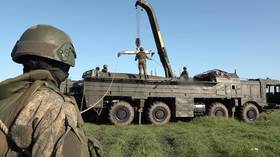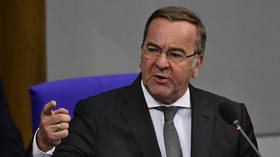Russia doesn’t ‘rule out’ nuclear response to US missiles in Europe – deputy FM

Moscow reserves the right to deploy missiles with nuclear warheads if the US goes ahead with plans to station longer-range missiles in Germany, Deputy Foreign Minister Sergey Ryabkov told journalists on Thursday.
Ryabkov was commenting on a recent announcement by Washington and Berlin, in which the two nations said the weapons could arrive in Germany as early as 2026. Asked about a potential Russian response to the deployment, he stated that “no options are ruled out,” including nuclear options.
According to the deputy foreign minister, Moscow should measure its response to these types of steps on the basis of the combined power of all NATO members. This means that Russia should not impose any “internal restraints” upon itself, he said, adding that Moscow should have “the broadest possible” number of options.
Any move on Russia’s part would not be a “threat to anyone” but rather “the most effective… approach to responding to changing threats,” Ryabkov said. He also argued that if Berlin believes that “escalatory actions” are justified, then Moscow is free to react “in a way it deems the most appropriate.”
In a joint press release published by the White House on July 10, Washington and Berlin said the US “will begin episodic deployments of the long-range fires capabilities of its Multi-Domain Task Force in Germany in 2026” as part of a strategy involving long-term deployment in the future.
The list of the US weapons that could end up in Germany includes SM-6s, Tomahawk missiles, and hypersonic weapons which are still in development, according to the statement. The missiles will only have conventional armaments, the document said.
Commenting on the development, German Defense Minister Boris Pistorius told several local media outlets that the future deployment is “nothing other than a [response] to the Russian threat of the Iskander [missiles] in Kaliningrad.” Pistorius also called the US weapons a deterrent, adding that “we need to protect ourselves the best we can.” He also claimed that the US and Germany “do everything to ensure that no escalation occurs.”
On Thursday, Ryabkov said that a further escalation is “not predetermined.” Instead, it is the West that “uses trumped-up pretexts” and accuses Russia of somehow threatening its security and then “following this escalation path.” He called this policy “regrettable,” but stated that it would not stop Russia from ensuring its own national security.













